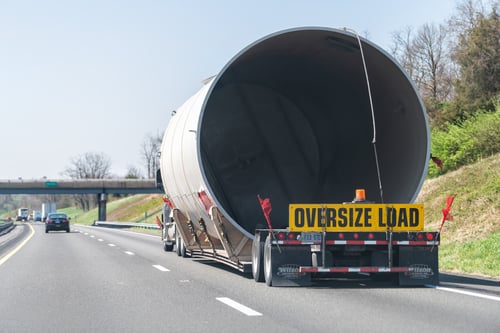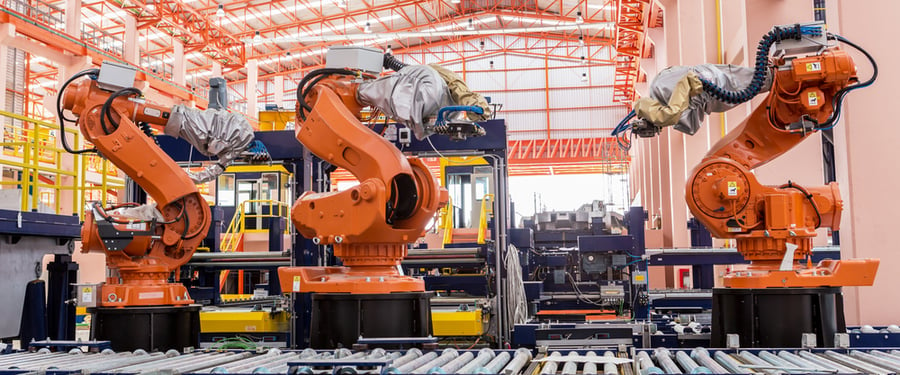Fueled in large part by a surge in technological innovation, the industrial manufacturing space looks set to acquire heightened production efficiency in the coming years. A near exponential growth in automation technologies brings the potential for faster, leaner supply chains — particularly in industrial manufacturing, with its already deep reliance on heavy machinery for production. Rounding out that rosy image, check out the financials. The heavy construction and industrial manufacturing industry is projected to reach over $2.4 billion by 2027, with annual growth exceeding 4%, according to AMR’s Heavy Construction Equipment Market Outlook.
But despite a promising long-term outlook, manufacturers of industrial equipment are struggling in 2022. Unprecedented supply chain challenges, ongoing barriers to heavy and oversized shipments, and rising prices of raw materials have all battered heavy equipment manufacturers since the beginning of the Covid-19 pandemic. Those are some hefty problems, even for an industry that specializes in shifting heavy stuff. The question is, where to next? Read on to get our take.
Industry challenges
Oversize shipment
The industrial manufacturing supply chain is built on oversized shipments. With the Great Resignation leaving the trucking workforce severely underpowered, heavy equipment manufacturers are struggling to find suitable trucks. Shipping lane reliability has eroded, and companies are forced to invest increasing amounts of time on freight troubleshooting. Carrier rates are steadily increasing across the board, but especially for shipping heavy, specialized equipment. Adding to the complexities, for all the reasons stated above, industrial manufacturers are also finding it increasingly difficult to acquire new equipment. Moreover, less equipment is actually available on the market thanks to rising steel prices and a global shortage of electronic components. Lead times on oversized equipment orders are the longest they’ve been since 1987, according to the Institute for Supply Management 2021 Report on Business.
Scarcity and cost of raw materials
Resin supplies are scarce and costs are spiraling. Electronic component availability is dwindling, steel prices are soaring. We’re seeing a growing scarcity of a wide range of raw materials that form the backbone of manufactured industrial products. Industrial manufacturers are needing to contend with long raw material lead times, ongoing shortages of key raw materials, and rapidly rising costs, according to Timothy Fiore, business survey committee chair with the Institute of Supply Management, in a late 2021 Bloomberg article. The choice, for a growing number of industrial manufacturers, is to vie for materials in an intensely competitive marketplace or pivot production processes to use new materials. Enterprises supporting these supply chains face the challenge of keeping up.
Supply chain delays and rising freight costs
Delivery delays have caused pervasive disruption across the heavy equipment manufacturing industry, a sector that has historically relied heavily on on-time delivery. Exacerbating the time pressures, delivery costs have spiked significantly since Covid. To manage spiraling freight expenses on heavy equipment, industrial manufacturers are working with 3PLs to develop in-house systems for freight pricing and carrier selection.
Emerging developments
Automation
Automation is an industrial arms race raging between a handful of large robotics manufacturers. Interviewed in early 2022 for Packaging Strategies, the head of product development for a leading robotics firm said, “the growing demands of the industry for quicker, more diverse production and greater responsiveness to changing market conditions call for solutions that bring new levels of speed, accuracy, and flexibility.” The Covid-19 pandemic has only served to accelerate the push toward automation. Manufacturing giants will continue to nudge production away from the traditional shop floor and toward remotely monitored, enormous, fast, and insanely agile robot-driven assembly lines.
 We’re still learning how automation will change supply chains, worldwide. On the one hand, automation may bring back some of the resiliency that’s so lacking in the wake of the Covid-19 Pandemic and ensuing upheaval of labor. On the other hand, this transformation will, without a doubt, make supply chains more complex and intricate. The challenge for carriers, 3PLs, and the freight industry as a whole will be to keep up with the pace of change.
We’re still learning how automation will change supply chains, worldwide. On the one hand, automation may bring back some of the resiliency that’s so lacking in the wake of the Covid-19 Pandemic and ensuing upheaval of labor. On the other hand, this transformation will, without a doubt, make supply chains more complex and intricate. The challenge for carriers, 3PLs, and the freight industry as a whole will be to keep up with the pace of change.
Cybersecurity concerns
Cybersecurity risks are pervasive in our globally interconnected economy. However, the damaging consequences of malicious network intrusion are particularly high in the industrial manufacturing sector. In a pre-Covid industry-wide survey, manufacturing software developer iBaseT found that 44 percent of industrial manufacturing companies have failed to perform annual intrusion and related industry-recommended cybersecurity practices. While we can’t locate a more recent survey, it’s extremely likely that Covid disruption is continuing to push that figure in the wrong direction.
Solutions
Full-time carrier management
The traditional approach to oversize shipping consisted of one of two methods: dynamic rate shopping and contract rates. Rate shopping for every shipping transaction is a labor-intensive and time-consuming process. Contracted freight services reduce a company’s administrative time outlay but rates hover in excess of 15% above spot market rates.
Industrial manufacturers are turning to 3PLs to craft more nuanced supply chain solutions that segment their freight operation into high, mid, and low-volume shipping lanes. Full-time carrier management can equip companies to better manage risk. Companies gain predictable rates and set delivery schedules for high-volume lanes, and get to balance variability against cost for their mid to low-volume lanes.
Customized TMS
 A customized transportation management solution can introduce greater efficiency and consistency to a complex supply chain — particularly in companies whose manufacturing process involves multiple production locations or decision-makers. A customized TMS equips a company with a centrally coordinated resource for negotiating rates with carriers, tracking shipments, handling supply chain paperwork, and coordinating a rapid response when confronted with supply chain problems.
A customized transportation management solution can introduce greater efficiency and consistency to a complex supply chain — particularly in companies whose manufacturing process involves multiple production locations or decision-makers. A customized TMS equips a company with a centrally coordinated resource for negotiating rates with carriers, tracking shipments, handling supply chain paperwork, and coordinating a rapid response when confronted with supply chain problems.
One of the biggest emerging workforce challenges in the industrial manufacturing space has been the sharp increase in time required to keep a supply chain moving. A customized transportation management solution can be effective in addressing that problem.
Increased visibility into shipment data
Heavy industrial manufacturing shipments are typically large, specialized, and shipped under considerable time pressure. Companies need clear, real-time visibility over their shipments. A business intelligence dashboard offers that insight and better equips companies to combat supply chain uncertainties. Check out this case study for an example of how one heavy equipment manufacturer used a BI dashboard to transform its freight unpredictability into a 10% profit margin.
Big challenges, bold solutions
The industrial manufacturing sector has its work cut out for it over the next few years. IL2000 can help — with expertise, analytics, and insight built for heavy lifting. Take control of your supply chain strategy. Contact us today.

